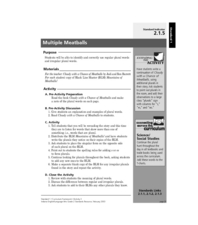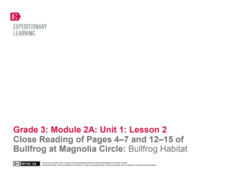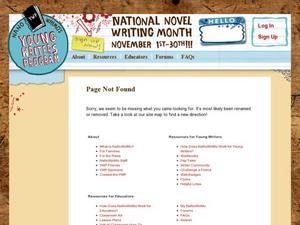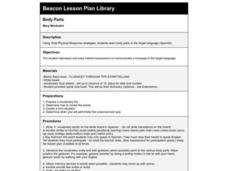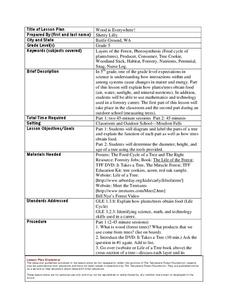Curated OER
Interjections
Teach your class that they can use interjections to make their writing more interesting. Individuals read a selection of sentences from their book using great expression and then explain to the teacher how interjections can make their...
Curated OER
Multiple Meatballs
The book Cloudy With A Chance Of Meatballs, is read aloud,and students listen for regular and irregular plurals in the story. They record their words on a worksheet which is embedded in the plan. This activity provides good practice...
Curated OER
Drawing Lessons
Students recognize and respond to the content of visual art using art vocabulary. They recognize the differences between art materials, techniques, and processes.
Curated OER
Stimulating Narrative Writing
Learners create an art project and write a process paper as a response to literature. In this literature response lesson, students listen to Lynn Ehlert's, Snowballs before decorating a construction paper snowman. They write...
EngageNY
Editing and Publishing: Accessing Books Around the World Informative Paragraph
Provide time to polish paragraphs in class. Pupils, who have been working on these informational pieces for several days now, will have a chance to check for spelling and grammar before publishing their work. Sure to be a rewarding final...
Jessica Winston
Gingerbread Friends Lesson Plan Guide
Full of activities for Jan Brett's story "Gingerbread Friends," this resource will get your kids in the mood for some snacks, fortify their need for vocabulary, and fill their minds with story elements.
EngageNY
Paragraph Writing, Part II
Come up with a list of requirements for this expository essay on Esperanza's character in Esperanza Rising as a class and use the list to guide class writing. Here, learners will complete the first paragraph, discuss their notes for the...
Kenan Fellows
What Element Would You Be?
Primo Levi wrote a collection of short stories comparing his life from Italy to Auschwitz to elements in the periodic table. Pupils read an excerpt from his book and research the characteristics of various elements. Then, they make a...
American Library Association
Even and Odd Numbers: Lesson Plans and Sample Problems
If your youngsters are new to numbers, here are several interactive strategies to get them thinking about even and odd numbers. For example, they can count the number of desks, people, etc. in the room and determine if it is even or odd....
Curated OER
The Outsiders: Question Answer Relationships Strategy
Kids learn best when asking questions about what they have read. Encourage active reading with a comprehension activity based on S.E. Hinton's The Outsiders, in which kids read passages from the beginning of the book and identify...
EngageNY
Close Reading of Pages 4 - 7 and 12 - 15 of Bullfrog at Magnolia Circle: Bullfrog Circle
Scholars take part in a close reading of pages four through seven and 12-15 of the book, Bullfrog at Magnolia Circle: Bullfrog Circle by Deborah Dennard. Readers identify the story's main idea, list its key details, and examine...
Curated OER
Lesson Plan 5: Creating a Supporting Character
As a class, young writers learn how to develop a strong supporting character. They think and discuss a good friend they know, they use that friend as a basis for a potential supporting character. They create a supporting character as a...
Anti-Defamation League
"What is it Like to be an Outsider?”: Building Empathy for the Experiences of Immigrants
This lesson highlights the struggles of immigrants and the importance of showing empathy. Beginning with a read-aloud of a book in another language and a poem, scholars take part in a thoughtful discussion. Then, the class examines a...
Nemours KidsHealth
Stress: Grades 6-8
Two lessons take a close look at stress. In instructional activity one, scholars identify common stressors and examine stress management strategies. Lesson two challenges pupils to keep a stress log for four weeks to aid in their...
PBS
Exploring First-Person Narrative
If you really want to know, this is a terrific lesson all about narratives, which is just a fancy way of saying telling stories. And you get to do it without being phony or anything. My favorite part is that you get to read a passage...
Pace University
Urban Communities
Urban communities are the focus of a series of lessons created to meet specific needs using differentiated instruction. A pre-assessment designates scholars into three groups based on their ability level. Small groups take part in...
Curated OER
Our Class Record Book
Second graders, in groups, prepare a list of proposed record ideas for the class book.
Curated OER
Class Book
Third graders review how they can save their work on a computer once they are finished. As a class, they complete various assignments based on a rubric they are given and save them to a disk. Using the assignments, they combine all of...
Curated OER
How To: Friendly Letter Writing
Second graders investigate the proper mechanics of a letter by writing to fictional characters. In this friendly letter activity, 2nd graders read the book Stars in the Darkness, analyzing the story and characters with classmates....
Curated OER
A Seed for All Needs
Students identify uses for plants. In this agricultural lesson, students read the book Spring Gardening and distinguish between food plants and flowers. Students plant flower in cups as a follow-up activity.
Curated OER
Understanding the Roots
Young scholars investigate the parts of a flower. For this earth science lesson, students read the book The Magic School Bus Plants Seeds and identify various plant parts. Young scholars construct a model of a flowering plant from...
Curated OER
Wood is Everywhere!
Fifth graders diagram and label the parts of a tree. For this lesson on how trees obtain food, 5th graders diagram and label the parts of a tree, and determine the diameter, height, and age of a tree.
Curated OER
Plant Cycles
Students identify plants parts and their functions. In this plant cycle lesson, students examine parts of plants and how the parts help them survive in its environment. Students use graphic organizers, the internet, books and...

